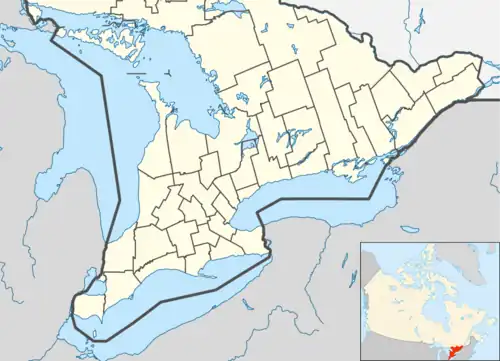Machar | |
|---|---|
| Township of Machar | |
 Machar | |
| Coordinates: 45°52′N 79°28′W / 45.867°N 79.467°W | |
| Country | Canada |
| Province | Ontario |
| District | Parry Sound |
| Government | |
| • Type | Township |
| • Mayor | Lynda Carleton |
| • Federal riding | Parry Sound-Muskoka |
| • Prov. riding | Parry Sound—Muskoka |
| Area | |
| • Land | 182.65 km2 (70.52 sq mi) |
| Population (2021)[1] | |
| • Total | 969 |
| • Density | 5.3/km2 (14/sq mi) |
| Time zone | UTC-5 (EST) |
| • Summer (DST) | UTC-4 (EDT) |
| Postal Code | P0A |
| Area code(s) | 705, 249 |
| Website | www.machartownship.net |
Machar is a township in the Canadian province of Ontario.
Located in the Almaguin Highlands region of Parry Sound District, Machar surrounds but does not include the village of South River.
Communities
- Bray Lake
- Eagle Lake
- Maecks
Demographics
| Year | Pop. | ±% |
|---|---|---|
| 1991 | 827 | — |
| 1996 | 835 | +1.0% |
| 2001 | 849 | +1.7% |
| 2006 | 866 | +2.0% |
| 2011 | 923 | +6.6% |
| 2016 | 882 | −4.4% |
| 2021 | 969 | +9.9% |
| [2][3][1] | ||
In the 2021 Census of Population conducted by Statistics Canada, Machar had a population of 969 living in 459 of its 875 total private dwellings, a change of 9.9% from its 2016 population of 882. With a land area of 182.65 km2 (70.52 sq mi), it had a population density of 5.3/km2 (13.7/sq mi) in 2021.[4]
Etymology
This township in Parry Sound District was named by Sir Oliver Mowat in 1875 for the Rev John Machar (1796-1863), a founder of the Presbyterian Church of Upper Canada in 1831 and of Queen's College (University) in 1841, where he served as principal, 1843-53.[5]
See also
References
- 1 2 "Census Profile, 2021 Census Machar, Township". Statistics Canada. Retrieved February 9, 2022.
- ↑ Statistics Canada: 1996, 2001, 2006
- ↑ Statistics Canada 2021 Census - Machar Census Profile
- ↑ "Population and dwelling counts: Canada, provinces and territories, census divisions and census subdivisions (municipalities), Ontario". Statistics Canada. February 9, 2022. Retrieved April 2, 2022.
- ↑ Rayburn, Alan (1997). Place Names of Ontario. Toronto: University of Toronto Press. p. 202. ISBN 0-8020-7207-0.
